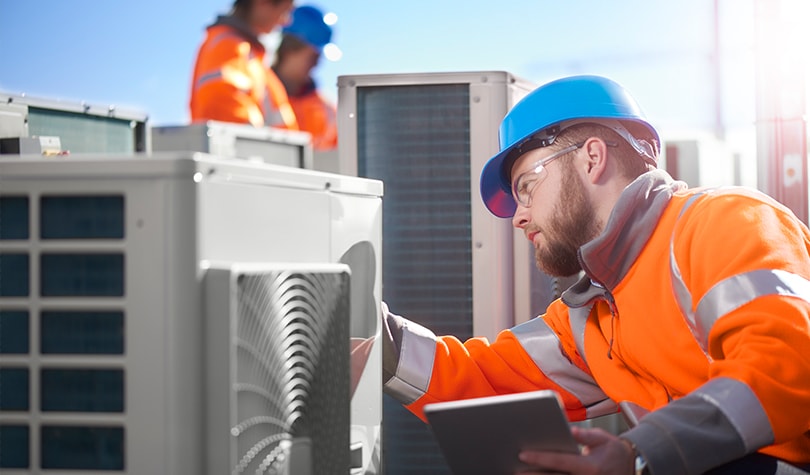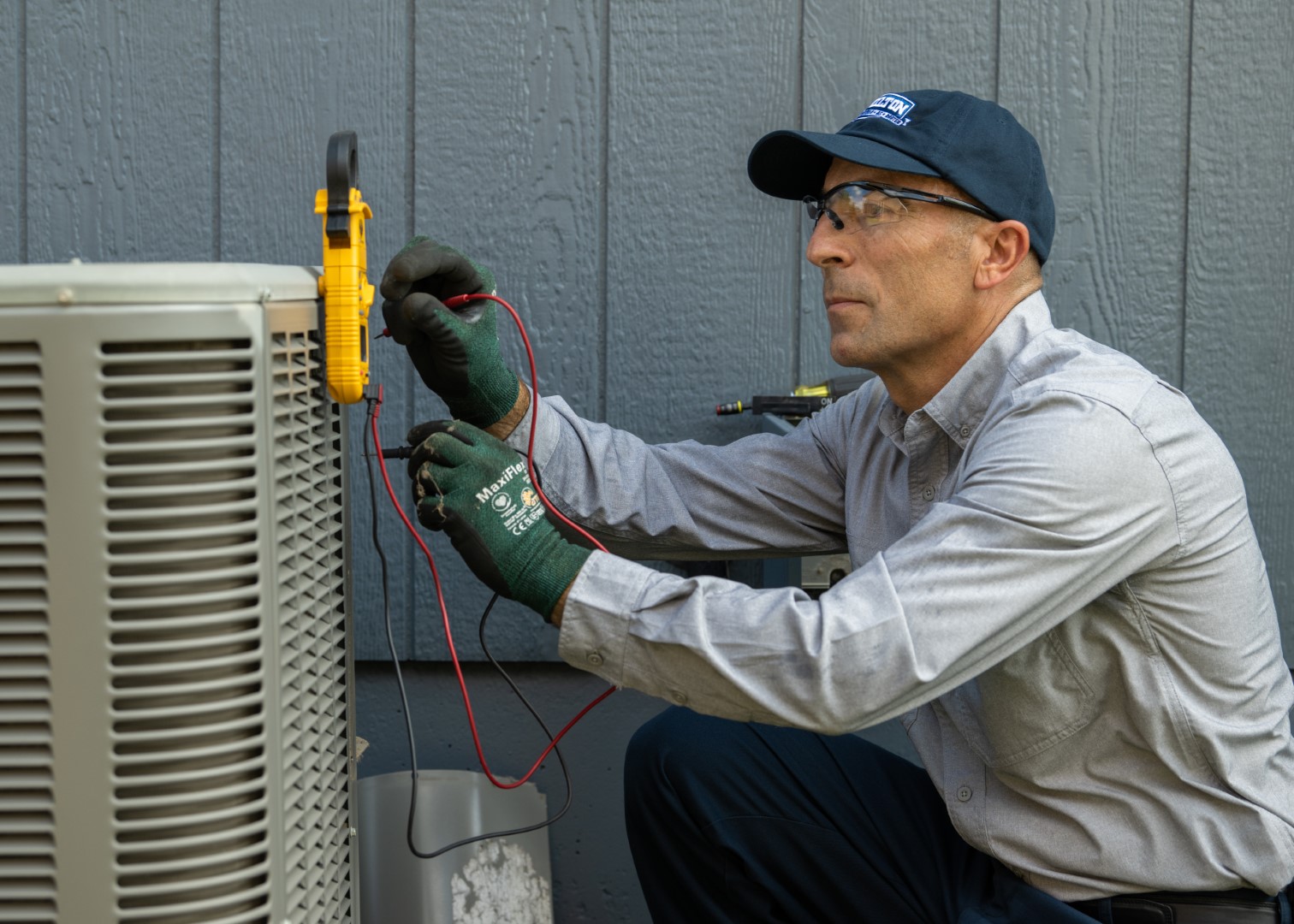Why working with an AC repairman can improve indoor comfort
Wiki Article
Everything about A/c: Identifying Common Issues and Effective Air Conditioning Repair Approaches
Heating and cooling systems are vital for preserving indoor comfort. Recognizing their components and performance is important for recognizing common concerns. Homeowners often encounter issues such as inefficient air conditioning, odd odors, or climbing power expenses. These indications can show underlying problems that might need interest. Discovering do it yourself troubleshooting strategies can be valuable, however recognizing when to seek expert assistance is equally essential. What actions can be taken to guarantee resilient performance?Comprehending Your Heating And Cooling System: Parts and Performance
A cooling and heating system, usually taken into consideration the backbone of indoor climate control, includes several crucial parts that collaborate to manage temperature level and air top quality. The primary elements consist of the heating unit, ventilation system, and cooling system. The home heating unit, commonly a heater or boiler, produces warmth during colder months, while the a/c system cools down indoor rooms during the summer.
Usual Cooling And Heating Issues Home Owners Encounter
Property owners commonly deal with a number of common cooling and heating problems, including inconsistent temperature circulation throughout their living spaces. In addition, uncommon sounds throughout procedure can indicate underlying concerns that need focus. Dealing with these issues quickly is crucial for keeping excellent system efficiency.Inconsistent Temperature Distribution
Lots of households experience the frustrating issue of irregular temperature circulation, where certain areas really feel uncomfortably warm while others stay as well cool. This issue typically occurs from a selection of variables, including poor insulation, blocked vents, or an incorrectly sized a/c system. When ducts are not sufficiently sealed or when furnishings obstructs air flow, some areas may obtain not enough air conditioning. In addition, thermostat positioning can substantially impact temperature regulation; a thermostat located in a sunlit location might misstate the overall temperature of your home. Routine maintenance, including cleansing filters and guaranteeing ductwork is clear, can assist ease these inconsistencies. Property owners might additionally think about zoning systems to far better control temperatures throughout various areas of the home, promoting a more comfortable living environment.Unusual Noises During Procedure
When a HVAC system operates, unusual noises can indicate underlying problems that need focus. House owners might come across a series of sounds, such as grinding, squeaking, or hissing. Grinding noises frequently indicate worn-out bearings or elements, while squeaking can recommend loosened belts or parts needing lubrication. Hissing may suggest a cooling agent leakage, which can jeopardize the system's efficiency. In addition, banging audios could direct to loosened ductwork or an issue with the blower fan. Each of these noises acts as a caution, motivating house owners to explore better. Disregarding these indicators can lead to even more significant troubles and pricey repair work. Regular upkeep and timely focus to unusual noises can enhance system longevity and performance, guaranteeing a comfy living setting.Indicators That Indicate Your AC Demands Repair Work
Just how can one tell if their cooling unit wants repair work? A number of indicators might show underlying problems needing professional interest. If the AC stops working to cool down the room properly, it may suggest a cooling agent leakage or compressor malfunction. Additionally, an increase in energy bills without corresponding use changes can indicate inadequacy in the system. Home owners must likewise look out to uncommon smells rising from the system, which could suggest mold growth or electrical problems. In addition, if the AC often cycles on and off, it could be an indicator of a damaged thermostat or other mechanical issues. The visibility of water merging around the unit can show a clogged up drainpipe line. Identifying these indicators early can conserve money and time, ensuring that the cooling system operates successfully and properly.Do It Yourself Troubleshooting Techniques for Heating And Cooling Issues
When dealing with a/c problems, home owners can employ a number of do it yourself troubleshooting techniques to identify the trouble. Trick techniques consist of examining thermostat setups, checking air filters, and assessing water drainage issues. These actions can help pinpoint common malfunctions prior to seeking professional aid.Examining Thermostat Settings
What actions should home owners take to ensure their thermostat settings are proper? They must validate the thermostat is set to the wanted temperature and setting, whether home heating or air conditioning. Looking for a clear display screen and validating the thermostat is not set to "hold" or "holiday" mode is necessary. House owners need to likewise verify that the thermostat is degree you can try these out and set up in a place without drafts, straight sunshine, or other temperature influences. In addition, recalibrating the thermostat can assist offer accurate readings. If the thermostat runs on batteries, changing them may fix any type of issues. By methodically examining these variables, home owners can typically determine and fix thermostat-related problems, advertising excellent a/c system performance.Inspecting Air Filters
Air filters play a necessary role in keeping perfect heating and cooling efficiency. They catch dirt, allergens, and other fragments, guaranteeing clean air blood circulation. In time, filters can end up being clogged up, decreasing air movement and performance. To evaluate air filters, people should first situate the filter, commonly discovered in the return duct or near the heater. Once situated, they must examine the filter's problem-- if it appears unclean or blemished, it most likely needs replacement. Many filters require transforming every 1-3 months, relying on use and ecological variables. Regular evaluation and prompt substitute of air filters not just boost air high quality yet also extend the life expectancy of a/c systems, preventing possible malfunctions and expensive repair services.
Reviewing Water Drainage Issues
Exactly how can homeowners effectively identify and deal with drain problems within their HVAC systems? Initially, they need to inspect the condensate drain line for blockages or obstructions, which can cause water build-up. House owners might use a wet/dry vacuum cleaner to get rid of any type of debris obstructing the line. Next, checking the drain pan for rust or leaks is essential, as a harmed pan can cause water to overflow. Routine cleansing of the drainpipe line with a mix of vinegar and water aids stop future clogs. In addition, making certain appropriate incline of the drainpipe line advertises effective water flow. If these DIY methods do not resolve the concern, getting in touch with an expert a/c technician might be needed to stay clear of potential water damages and system failure.When to Call a Specialist for Air Conditioner Repairs

While some a/c issues can be managed via do it yourself techniques, there are circumstances where calling a professional ends up being necessary. House owners should seek experienced support when they come across persistent issues, such as poor air conditioning, weird noises, or uncommon odors emanating from the device. These signs might show much deeper issues that require specialized understanding and devices to identify and repair correctly.

Preventative Maintenance Tips for A/c Durability
Regular preventative upkeep can greatly enhance the long life of a/c systems. Property owners need to schedule yearly evaluations by certified technicians to analyze system effectiveness and identify potential concerns. Regularly changing or cleaning air filters is important, as this warranties correct air flow and lowers pressure on the system. On top of that, inspecting and sealing ductwork avoids energy loss and enhances overall performance.
It is likewise recommended to keep the exterior unit free from particles and greenery, enabling peak air flow and heat exchange. Home owners should inspect the condensate drainpipe for blockages to prevent water damages and mold and mildew development. Furthermore, keeping ideal thermostat settings and making use of programmable options can enhance energy effectiveness. Finally, recording upkeep activities aids track service background and can assist in recognizing persisting problems (ac fix). By adhering to these preventative steps, individuals can make the most of the performance and life-span of their cooling and heating systems
Regularly Asked Inquiries
How Usually Should I Replace My A/c System Filters?
Cooling and heating system filters must normally be changed every one to 3 months, depending on use, filter kind, and environmental variables. Normal substitute assists maintain efficiency and air top quality, making certain peak system efficiency throughout the year.What Size HVAC System Do I Required for My Home?
about his To figure out the proper cooling and heating system size for a home, one must consider square footage, insulation quality, and regional climate. Consulting a specialist can help assure optimal performance and convenience for the particular living area.Exist Eco-Friendly Cooling And Heating Options Available?
Yes, green a/c options are readily available, consisting of energy-efficient heatpump, solar-powered systems, and geothermal home heating. These options decrease energy intake and ecological effect, promoting sustainability while keeping efficient environment control for property and commercial areas.How Can I Improve My a/c System's Energy Efficiency?
To boost cooling and heating energy effectiveness, one can regularly keep the system, seal air leakages, set up programmable thermostats, utilize energy-efficient filters, and warranty appropriate insulation throughout the home to minimize energy consumption and enhance efficiency.
What Is the Ordinary Life Expectancy of a Heating And Cooling System?
The typical life-span of a heating and cooling system usually varies from 15 to 25 years, depending on factors such as maintenance, usage, and the quality of installation. Routine upkeep can substantially expand its operational durability.Conclusion
In recap, an extensive understanding of a/c systems equips homeowners to identify typical problems and address small problems properly. Recognizing indications of malfunction, utilizing do it yourself troubleshooting strategies, and prioritizing normal upkeep can boost system efficiency and effectiveness. When encountered with intricate repair work, getting specialist aid is important to guarantee safety and security and durability. By promoting awareness and proactive treatment, people can delight in a comfortable interior environment while reducing unforeseen costs connected with a/c failures.Report this wiki page